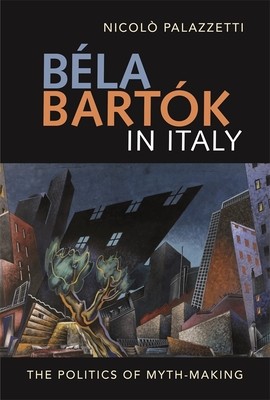
- We will send in 10–14 business days.
- Author: Nicolò Palazzetti
- Publisher: Boydell Press
- ISBN-10: 1783276207
- ISBN-13: 9781783276202
- Format: 15.2 x 23.1 x 2.5 cm, hardcover
- Language: English
- SAVE -10% with code: EXTRA
Reviews
Description
Examines the reputation of the Hungarian musician Béla Bartók (1881-1945) as an antifascist hero.
This book examines the reputation of the Hungarian composer Béla Bartók (1881-1945) as an antifascist hero and beacon of freedom. Following Bartok's reception in Italy from the early twentieth century, through Mussolini's fascist regime, and into the early Cold War, Palazzetti explores the connexions between music, politics and diplomacy. The wider context of this study also offers glimpses into broader themes such as fascist cultural policies, cultural resistance, and the ambivalent political usage of modernist music. The book argues that the 'Bartókian Wave' occurring in Italy after the Second World War was the result of the fusion of the Bartók myth as the 'musician of freedom' and the Cold War narrative of an Italian national regeneration. Italian-Hungarian diplomatic cooperation during the interwar period had supported Bartok's success in Italy. But, in spite of their political alliance, the cultural policies by Europe's leading fascist regimes started to diverge over the years: many composers proscribed in Nazi Germany were increasingly performed in fascist Italy. In the early 1940s, the now exiled composer came to represent one of the symbols of the anti-Nazi cultural resistance in Italy and was canonised as 'the musician of freedom'. Exile and death had transformed Bartók into a martyr, just as the Resistenza and the catastrophe of war had redeemed post-war Italy.EXTRA 10 % discount with code: EXTRA
The promotion ends in 17d.17:03:55
The discount code is valid when purchasing from 10 €. Discounts do not stack.
- Author: Nicolò Palazzetti
- Publisher: Boydell Press
- ISBN-10: 1783276207
- ISBN-13: 9781783276202
- Format: 15.2 x 23.1 x 2.5 cm, hardcover
- Language: English English
Examines the reputation of the Hungarian musician Béla Bartók (1881-1945) as an antifascist hero.
This book examines the reputation of the Hungarian composer Béla Bartók (1881-1945) as an antifascist hero and beacon of freedom. Following Bartok's reception in Italy from the early twentieth century, through Mussolini's fascist regime, and into the early Cold War, Palazzetti explores the connexions between music, politics and diplomacy. The wider context of this study also offers glimpses into broader themes such as fascist cultural policies, cultural resistance, and the ambivalent political usage of modernist music. The book argues that the 'Bartókian Wave' occurring in Italy after the Second World War was the result of the fusion of the Bartók myth as the 'musician of freedom' and the Cold War narrative of an Italian national regeneration. Italian-Hungarian diplomatic cooperation during the interwar period had supported Bartok's success in Italy. But, in spite of their political alliance, the cultural policies by Europe's leading fascist regimes started to diverge over the years: many composers proscribed in Nazi Germany were increasingly performed in fascist Italy. In the early 1940s, the now exiled composer came to represent one of the symbols of the anti-Nazi cultural resistance in Italy and was canonised as 'the musician of freedom'. Exile and death had transformed Bartók into a martyr, just as the Resistenza and the catastrophe of war had redeemed post-war Italy.

Reviews